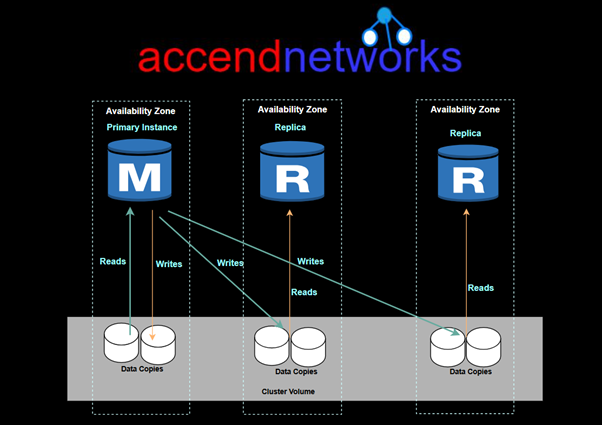Unlocking the Power of Amazon Aurora: A Comprehensive Guide to High-Performance Databases

Amazon Aurora is a fully managed, relational database service that combines the performance and availability of high-end commercial databases with the simplicity and cost-effectiveness of open-source databases. In this blog, we’ll explore the key features of Amazon Aurora, its advantages, and how it stands out in the world of cloud databases.
What is Amazon Aurora?
A fully managed MySQL and PostgreSQL-compatible relational database built for the cloud that combines the performance and availability of traditional enterprise databases with the simplicity and cost-effectiveness of open-source databases.
Two types of DB instances make up an Aurora DB cluster
Primary Instance — Supports read and write operations, and performs all of the data modifications to the cluster volume. Each Aurora DB cluster has one primary DB instance.
Replica Instances— Connects to the same storage volume as the primary DB instance and supports only read operations. Each Aurora DB cluster can have up to 15 Aurora Replicas in addition to the primary DB instance.

Key Points
- Amazon Aurora architecture gives separation of storage and computing.
- Automatic failover to reader instance — When a problem affects the primary instance, one of these reader instances takes over as the primary instance.
- The cluster endpoint always represents the current primary instance in the cluster. To use a connection string that stays the same even when a failover promotes a new primary instance, you connect to the cluster endpoint.
- Aurora automates and standardizes database clustering and replication, which are typically among the most challenging aspects of database configuration and administration.
Key Features of Amazon Aurora
High-Performance Amazon Aurora is designed to deliver performance that far exceeds traditional MySQL and PostgreSQL databases.
Scalability Aurora’s architecture supports auto-scaling to accommodate growing database needs. You can scale your database up or down with minimal manual intervention.
High Availability and Durability Aurora provides built-in high availability with a replication feature that spans multiple availability zones.
Automated Backups Amazon Aurora automates backups, and these backups are continuous and incremental, ensuring that no data is lost.
SecurityAmazon Aurora provides multiple layers of security. It supports encryption of data both at rest and in transit using SSL. Additionally, it integrates seamlessly with AWS Identity and Access Management (IAM) for access control, Amazon VPC for network isolation, and AWS Key Management Service (KMS) for key management.
Multi-Master Support Amazon Aurora supports multi-master replication, which allows you to write to multiple Aurora instances in different Availability Zones.
Amazon Aurora MySQL vs PostgreSQL
Amazon Aurora is compatible with both MySQL and PostgreSQL, and it provides a high level of performance for both engines. When choosing between Aurora MySQL and Aurora PostgreSQL, businesses should consider their application’s needs:
- Aurora MySQL is ideal for applications that rely on MySQL’s features and syntax but require more scalability and performance than what standard MySQL can offer.
- Aurora PostgreSQL provides the performance and scalability of Aurora with the rich feature set of PostgreSQL, making it a great choice for data-intensive applications that need advanced data types and custom functions.
Amazon Aurora Serverless
For applications with unpredictable database workloads, Amazon Aurora Serverless offers an on-demand, auto-scaling configuration. Aurora Serverless automatically adjusts the compute capacity based on application needs, and you only pay for the capacity you use. This makes it a cost-effective option for infrequent or variable workloads, such as development, testing, or low-traffic applications.
Read Replicas
- Elastically scale out beyond the capacity constraints of a single DB instance for read-heavy database workloads.
- Aurora Replicas connect to the same storage volume as the primary DB instance, but support read operations only.
- Aurora DB cluster with single-master replication has one primary DB instance and up to 15 Aurora Replicas.
Advantages of Amazon Aurora
Advantages:
- Global reads with local latency.
- Scalable secondary Aurora DB clusters.
- Fast replication from primary to secondary Aurora DB clusters.
- Recovery from Region-wide outages (lower RTO and RPO).
Use Cases for Amazon Aurora
E-commerce Platforms: With high availability, fault tolerance, and the ability to handle high traffic spikes, Amazon Aurora is perfect for large-scale e-commerce platforms that require database scalability.
Gaming: Games with large player bases can benefit from Aurora’s fast, scalable database capabilities, which can handle millions of transactions per second.
SaaS Applications: Aurora’s flexibility, high performance, and multi-region replication make it a great choice for SaaS companies that need reliable, low-latency access to their databases.
Conclusion
Amazon Aurora is a fully managed relational database engine that’s compatible with MySQL and PostgreSQL which makes it easier, faster, and cost-effective to manage your data and build scalable, reliable, and high-performance applications.
Thanks for reading and stay tuned for more.
If you have any questions concerning this article or have an AWS project that requires our assistance, please reach out to us by leaving a comment below or email us at sales@accendnetworks.com.
Thank you!

uL6FqUbGSzo
sZ7ByntaGDT
I can’t express how valuable this post is! The level of detail and thoughtful explanations demonstrate your mastery of the subject. Truly a goldmine of information.
Standing ovation! This post perfectly balances depth with accessibility. Your thorough research and expert explanations make this an invaluable resource. Keep up the amazing work!